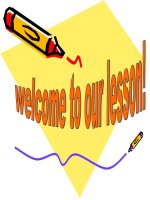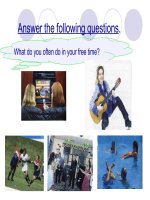english 11 - unit 14 - reading
Bạn đang xem bản rút gọn của tài liệu. Xem và tải ngay bản đầy đủ của tài liệu tại đây (2.2 MB, 23 trang )
I. WARM-UP:
•
Playing Game: Truc Xanh.
* NOTE:
Write down the vocabulary you learned in this
game.
II. PRE-READING:
Vocabulary
•
Recreation (n) = what we do when we don’t
work.
•
Average (n) = Ex: the average of 5, 9 and 4 is
6
(5+9+4)/3 = 6
•
undertaken (p.p) = to agree to do something.
•
Sophisticated (adj) = opposite meaning of
“simple”.
•
Dull (adj) = Boring.
II. PRE-READING:
Vocabulary
•
Recreation (n) = sự giải trí, sự tiêu khiển
•
Average (n) = trung bình
•
undertaken (p.p) = nhận, đảm trách
•
Sophisticated (adj) = phức tạp.
•
Dull (adj) = buồn tẻ, chán ngắt.
Activity 2: Guess which of the following leisure
activities British people often do in their spare time
watching TV/ videos
shopping
listening to music
playing sports
reading books / newspapers
meeting friends
watching sports
gardening
singing
spending time outdors
playing a musical
instrument.
Read the passage and then do
the task that follow
Task 1
•
The words/phrases in italics in the following
sentences all appear in the passage. Circle
the correct answer.
1.The activities are home based. They are
organised
A. at home
B. outdoors
C. In the basement of the house.
outdoors
Task 1
2. Television viewing is by far the most popular
pastime. This mean
A. People have to go very far to watch television.
B. television viewing is much more popular than any
other pastime.
C. television viewing is as popular as other pastime.
3. There are many different courses on offer. This
means
A. there are many different courses on television.
B. there are many different courses to be taken.
C. there are many different courses that teach
people to make offers.
B. television viewing is much more popular than any
other pastime.
B. there are many different courses to be taken.
5. Spectator sports are
A. sports people take part in
B. sports people often watch
C. beautiful sports.
4.Besides watching television, people have other
pursuits. This means
A. besides watching television, people have other
leisure activities.
B. besides watching television, people have to work.
C. besides watching television, people don’t enjoy
anything else.
Task 1
A. besides watching television, people have other
leisure activities.
B. sports people often watch
Task 1
6. Entry qualifications are
A. necessary conditions for being admitted to
the course.
B. ability to pay the fees.
C. entry examinations.
A. necessary conditions for being admitted to
the course
1. She is ____________ the best student in her class.
2. Ho Chi Minh devoted his life to the independent
______________ of our country.
3. The authority decided to build a stadium in Dalat to
meet the demand of watching _____________, such as
football, volleyball, etc. of local people.
4. Many universities in Vietnam had some solutions to
raise the _______________ to avoid the overload in the
quantity of students.
5. Being a housewife in a poor family, she must do
some ____________ jobs to earn more money for her
children’s study.
6. There are a number of tours ___________ on TV and
the Internet. If you want to enjoy an exciting holiday,
you can choose one of them.
Home based
by far
on offer
Pursuit
Spectator sports
Entry qualifications
•
1. What is the most popular pastime in Britain?
•
2. What are common home based leisure
activities that the British often do?
•
3. What sports do they like taking part in?
•
4. What are courses that the British can take
when they are not working?
•
5. Which qualifications are necessary for
weekend courses?
Task 2
Answers:
•
1. What is the most popular pastime in Britain?
In Britain, the most common leisure activities are
home based. Watching television is by far the
most popular pastime, and nearly all
households have a television set. Over 51
percent of households have two or more
television sets and average viewing time for
the population aged four and over is 25 hours
a week.
2. What are common home based leisure activities
that the British often do?
•
In Britain, the most common leisure activities are
home based. Watching television is by far the most
popular pastime, and nearly all households have a
television set. Over 51 percent of households have
two or more television sets and average viewing time
for the population aged four and over is 25 hours a
week. Other pursuits include listening to music,
reading, do-it-yourself home improvements, and
gardening.
3. What sports do they like taking part in?
•
British people are also very interested in watching
and taking part in sports. Walking and swimming are
the two most popular sporting activities, being almost
equally undertaken be men and women. Snookers,
pool and darts are the next most popular sports
among men.
4. What are courses that the British can take when they are not
working?
•
There is a enormous range of courses on offer. The
course can be as simple as bricklaying or as
sophisticated as making your own stock market
decisions. For people who are interested in art, there
are courses in painting or drawing. People who like
music can take a course in karaoke singing. Courses
like shoemaking or glass engraving provide people
with practical skills they can do with hands. Those
who want to improve their minds can take a course of
"Living with more meaning".
5. Which qualifications are necessary for
weekend courses?
•
Entry qualifications to weekend courses
are generous, that is, generally no
qualifications are necessary, apart from
an ability to pay the fees, which may be
quite high.
Main idea of each paragraph
Paragraph 1
Importance of Recreation
Home based activities.
Sporting activities.
Weekend or holiday courses.
Paragraph 2
Paragraph 3
Paragraph 4
III. Post – reading:
List of leisure activities:
-
Watching television,
- course of “living with
more meaning”,
-
listening to music,
- cricket,
-
reading,
-
do it yourself home
improvements,
-
bricklaying, gardening,
-
walking,
- swimming,
- Course of “living with more
meaning”.
- snooker,
-
pool,
-
darts,
- football,
-
rugby,
-
athletics,
- making your own stock
market decisions,
-
painting or drawing.,
- karaoke singing,
-
shoemaking,
-
glass engraving.
Home based
activities
Sporting
activities
Weekend or
holiday courses.
- Watching
television.
- listening to music.
- reading.
- do it yourself
home
improvements.
- gardening.
- Walking
- Swimming.
- Snooker.
- Pool.
- Darts.
- Football.
- Rugby.
- Cricket.
- Athletics.
- Bricklaying.
- Making your own
stock market
decisions.
- Painting or drawing.
Karaoke singing.
- Shoemaking.
- Glass engraving.
- Course of “living
with more
meaning”.
Homework
•
- Learn by heart the vocabulary.
•
- Answer the questions in Task 2 again in
the notebook.
•
- Prepare the next lesson









